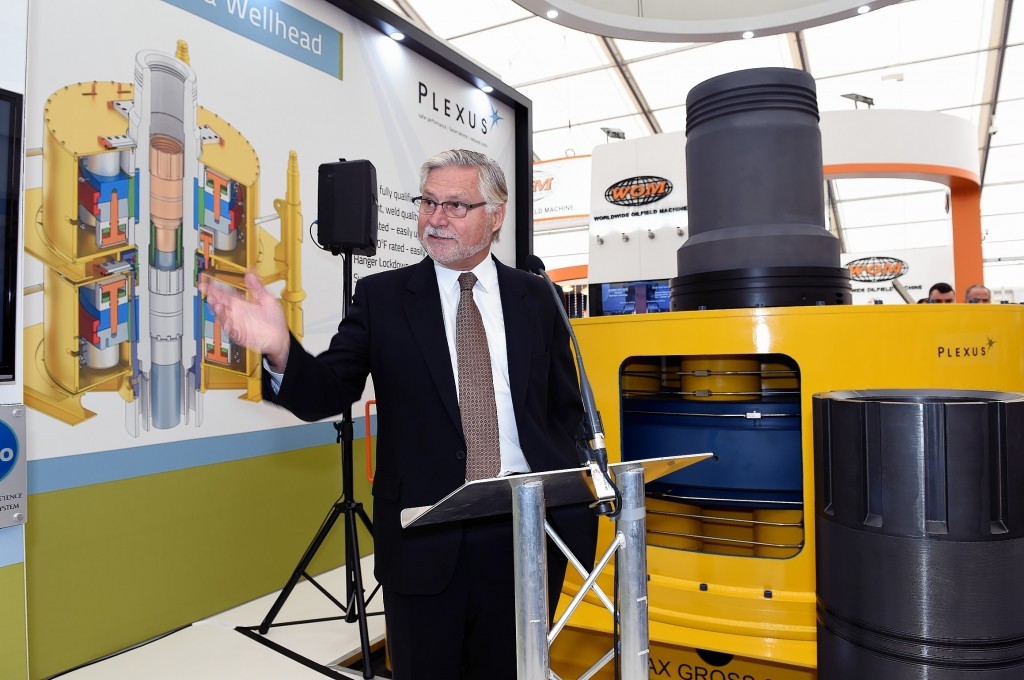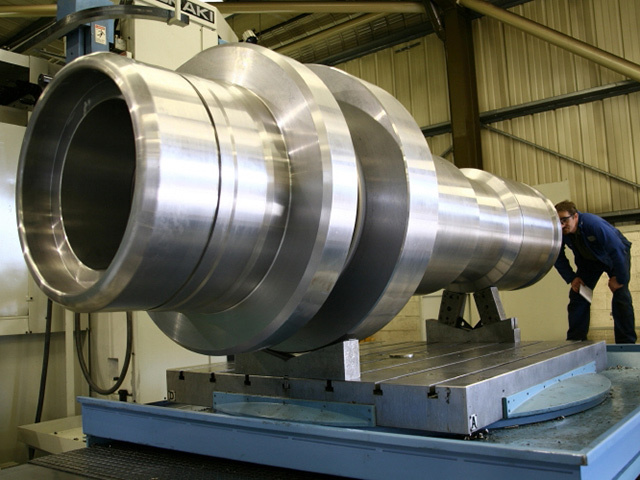
Aberdeen based engineering firm Plexus created a stir in the wellhead industry this year with the launch of its mould-breaking Python technology, but it was always 2016 that the company anticipated it deploying in earnest.
Finding technological and engineering solutions to complex problems is at the heart of the Plexus philosophy, but an equally hard challenge is to find the right opportunity to be able to deliver something new and genuinely ground-breaking, such as the Python.
Plexus technical director Craig Hendrie said: “It is always a big risk trying something for the first time. But we understand why the industry is risk averse. If we are not, we lose a lot of money and even worse, people get hurt.”
Plexus’ technologies are geared toward providing safer and cheaper drilling, a point that chairman Jeffrey Thrall said would work in the company’s favour in a new lower oil price environment.
Plexus launched its new POS-GRIP Python subsea wellhead during Offshore Europe in Aberdeen in September.
Under development since 2011, it was backed by a joint industry project consortium whose members include: BG, Shell, Wintershall, Maersk, Total, Tullow Oil, Eni, Senergy, and Oil States Industries.
Plexus states time savings during drilling are up to four days in shallow water, and up to 12 days per deepwater well, compared to conventional systems – representing considerable cost savings in terms of rig-hire and exploration budgets.
Hendrie said: “Python has been developed and made in Scotland. It is made us number six after the big five – Schlumberger, FMC, DrillQuip, GE (Vetco) and Aker – subsea companies in the world. The difference is they are multinationals with hundreds of thousands of employees, we have less than 200.
“Clearly it’s a huge challenge to enter that market and we needed something very special in order to compete.”
“Our customers are all extremely interested, but that doesn’t mean they’re rushing to place orders. With safety critical pieces of equipment, particulary in wellheads and blow out preventers (BOPs) – it’s still a big risk to try something for the first time.
“The leadership in our company are engineers who love to innovate and who love to do things because it’s the right way to do it. There’s nothing I love more than coming up with an idea and a couple of years later going into the workshop and saying ‘this is it, it works’.
“Since the early days of Plexus it’s been about getting the right customers who is going to support you and take the risk of trying to find something new. We can demonstrate how we can mitigate the risk and there’s a lot we can do to get a product field trialled and demonstrate the product really does work.
“Unless there are companies like us who are trying to develop new technology, then new products and new technology only really get used when something necessitates that.
“For example, when the capability of conventional technology runs out, operators find they have to find something new, that’s often the highest risk and most difficult way to introduce new technology.”
Plexus has experience of this, the first ever 20,000psi POS-GRIP tubing hanger system it deployed for BG on the Jackdaw exploration well was a step-change in requirement.
Hendrie explained: “It would have been nice to deploy that on a low-cost well but in the end Plexus had the only possible way of doing it. So the first time we ever tried our gas tight, metal-to-metal sealing, 20,000psi tubing hanger system was on a genuine well where they had gas at 18,000psi, the highest ever pressure gas test in the North Sea – and it was serial No.1.”
“Either scenario might happen with Python. We might be able to test in a benign, low-risk environment but it could be ‘trial by fire’ where the first real opportunity is again where the capacity or capability of conventional technology runs out.”
Hendrie said: “Conventional subsea wellheads are like a Swiss watch – there’s quite a lot going in there. With conventional setting tools and casing hangers, there is a large number of components which need to rotate, go together and work. When you consider you have to actuate this from 10,000ft away on a tiny piece of drill pipe, it becomes a big challenge.
“The other guys have fantastically impressive systems, because there’s so much complexity going on there.”
Plexus developed Python to remove the complexity that conventional systems require.
“We’ve eliminated all that complexity and gone for a solid, single hanger, no threads, no seal cavities: extreme simplicity. The reason we can do that is our proprietry POS-GRIP technology on the outside, which can squeeze and urge the whole wellhead housing to move inwards to get a friction grip and extremely good seal on the casing hanger on the inside.
“We developed that technology 15 years ago for surface applications and the removal of complexity means we can achieve better qualification standards.”
POS-GRIP Technology was invented by Plexus’ founder and chief executive, Ben van Bilderbeek.
Its first application in the oil and gas industry was an adjustable rental wellhead system for jack-up exploration drilling, which led to the development of proprietary high pressure and high temperature metal-to-metal HG seal production wellheads.
Hendrie added: “As everyone is acutely aware, the industry is not in the best place for forging ahead with new products.
“But we have no doubt that we will generate market share as time goes on. There is still potential to run the equipment in the next calendar year. We have some live opportunities that we are currently pursuing.
Recommended for you
